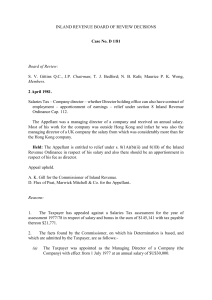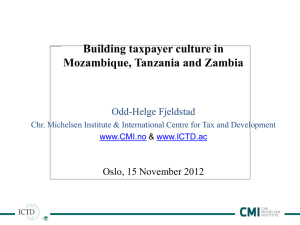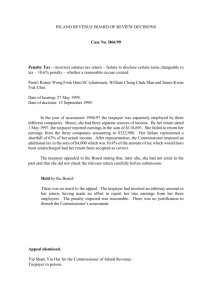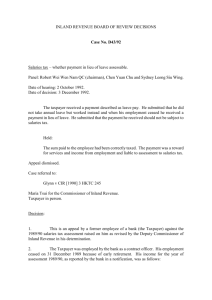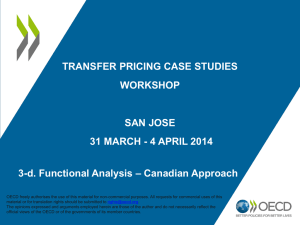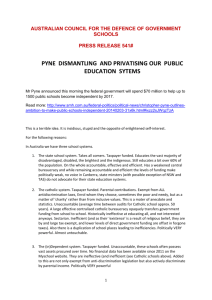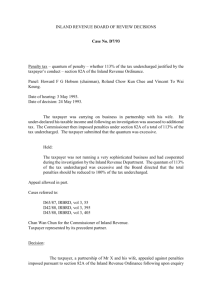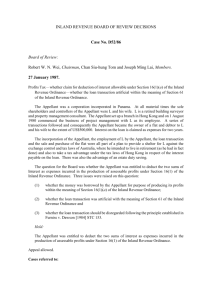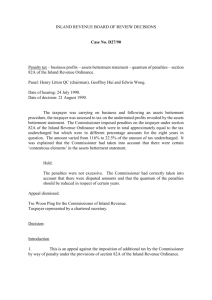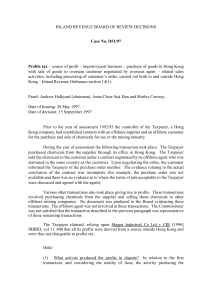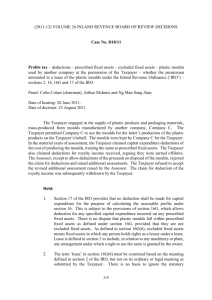Background
advertisement
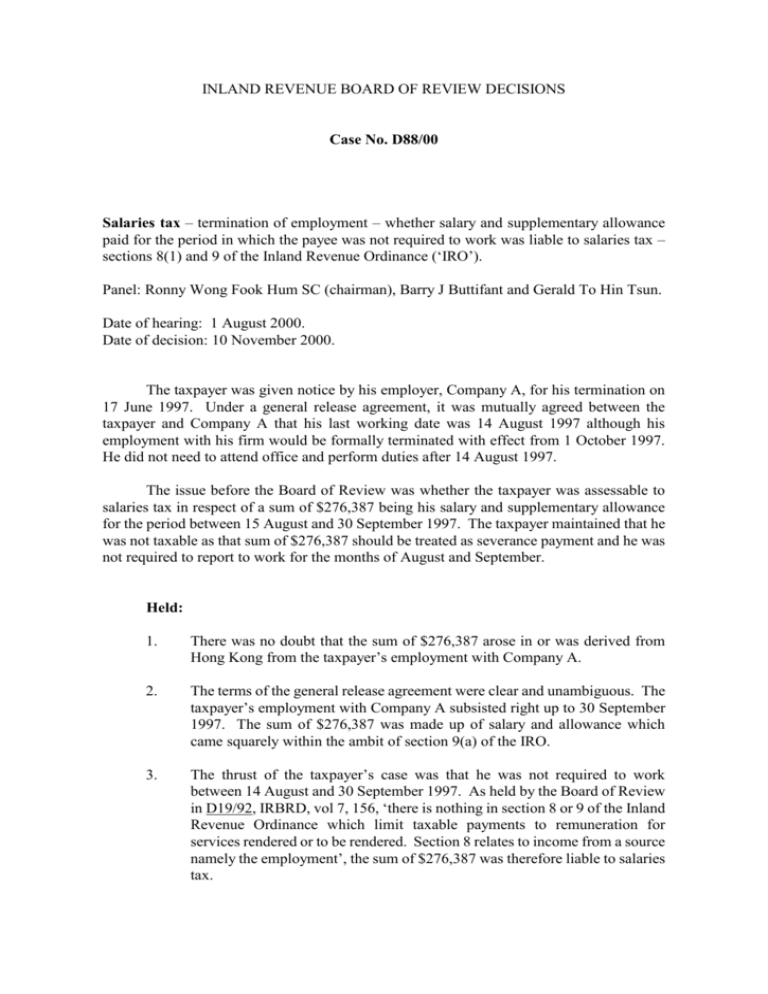
INLAND REVENUE BOARD OF REVIEW DECISIONS Case No. D88/00 Salaries tax – termination of employment – whether salary and supplementary allowance paid for the period in which the payee was not required to work was liable to salaries tax – sections 8(1) and 9 of the Inland Revenue Ordinance (‘IRO’). Panel: Ronny Wong Fook Hum SC (chairman), Barry J Buttifant and Gerald To Hin Tsun. Date of hearing: 1 August 2000. Date of decision: 10 November 2000. The taxpayer was given notice by his employer, Company A, for his termination on 17 June 1997. Under a general release agreement, it was mutually agreed between the taxpayer and Company A that his last working date was 14 August 1997 although his employment with his firm would be formally terminated with effect from 1 October 1997. He did not need to attend office and perform duties after 14 August 1997. The issue before the Board of Review was whether the taxpayer was assessable to salaries tax in respect of a sum of $276,387 being his salary and supplementary allowance for the period between 15 August and 30 September 1997. The taxpayer maintained that he was not taxable as that sum of $276,387 should be treated as severance payment and he was not required to report to work for the months of August and September. Held: 1. There was no doubt that the sum of $276,387 arose in or was derived from Hong Kong from the taxpayer’s employment with Company A. 2. The terms of the general release agreement were clear and unambiguous. The taxpayer’s employment with Company A subsisted right up to 30 September 1997. The sum of $276,387 was made up of salary and allowance which came squarely within the ambit of section 9(a) of the IRO. 3. The thrust of the taxpayer’s case was that he was not required to work between 14 August and 30 September 1997. As held by the Board of Review in D19/92, IRBRD, vol 7, 156, ‘there is nothing in section 8 or 9 of the Inland Revenue Ordinance which limit taxable payments to remuneration for services rendered or to be rendered. Section 8 relates to income from a source namely the employment’, the sum of $276,387 was therefore liable to salaries tax. INLAND REVENUE BOARD OF REVIEW DECISIONS Appeal dismissed. Case referred to: D19/92, IRBRD, vol 7, 156 Fung Chi Keung for the Commissioner of Inland Revenue. Taxpayer in person. Decision: Background By letter dated 27 June 1994, the Taxpayer was offered employment as senior vice president, head of technology in the Hong Kong office of Company A. Company A made it clear in this letter that the same ‘is not intended to be a contract of continuing employment. While the above salary and bonus commitment will be honoured ..., employment is for no fixed term, and either you or the Firm at any time and for any reason may decide to terminate the employment relationship.’ In around May 1997, Company A began to reduce its operations in Hong Kong. On or about 17 June 1997, the Taxpayer and Company A entered into a general release agreement in these terms: Effective dates 1. You acknowledge that there is a mutual agreement between you and the Firm that your employment with the Firm will be terminated with effect from 1 October 1997. 2. Your last day of active employment (that is, the last day which you were expected to report to work) will be 30 September 1997. 3. Your termination date (that is, the last date you will be on the Firm’s payroll) will be the earlier of 30 September 1997 or the date on which you become actively employed with another firm. Payments and benefits 4. You will continue to be paid on a monthly basis at your current monthly base salary and supplementary allowance through your termination date, INLAND REVENUE BOARD OF REVIEW DECISIONS during which time you will remain on the Firm’s payroll and your current benefits (health insurance, life insurance and pension scheme) will continue. 5. You will receive a special separation payment of $511,000 less any applicable deductions, to be paid on or about three weeks from your termination date. 6. ... 7. ... 8. Should you become employed by another firm as employee ... at any time through 30 September 1997 ... your employment by the Firm may be officially terminated that time. All salary payment and benefit entitlements ... will cease on the date your employment terminates.’ In response to the assessor’s enquiry, Company A provided the following information: ‘ [The Taxpayer] was given notice for his termination on 17 June 1997 and his last working date was 14 August 1997. He did not need to attend office and perform duties after 14 August 1997. This last working date was being determined by [Company A] and mutually agreed by both parties.’ The issue before us is whether the Taxpayer is assessable to salaries tax in respect of a sum of $276,387 being his salary and supplementary allowance for the period between 15 August and 30 September 1997. The Taxpayer maintains that he is not taxable as the sum ‘should be treated as severance payment. I was not required to report to work for the month of August and September ...’ The relevant provisions in the IRO (Chapter 112) The charging section is section 8(1). It provides that ‘ Salaries tax shall, subject to the provisions of this Ordinance, be charged for each year of assessment on every person in respect of his income arising in or derived from Hong Kong from the following sources: (a) any office or employment of profit; and (b) any pension.’ Section 9(1) of the IRO provides that ‘ Income from any office or employment includes – INLAND REVENUE BOARD OF REVIEW DECISIONS (a) any wages, salary, leave pay, fee, commission, bonus, gratuity, perquisite, or allowance, whether derived from the employer or others ...’ Our decision We have no doubt that the sum in question arose in or was derived from Hong Kong from the Taxpayer’s employment with Company A. The terms of the general release agreement are clear and unambiguous. The Taxpayer’s employment with Company A subsisted right up to 30 September 1997. The sum in question was made up of salary and allowance which come squarely within the ambit of section 9(a) of the IRO. The thrust of the Taxpayer’s case is that he was not required to work between 14 August and 30 September 1997. The answer can be found in D19/92, IRBRD, vol 7, 156 where the Board pointed out that ‘there is nothing in sections 8 or 9 of the Inland Revenue Ordinance which limit taxable payments to remuneration for services rendered or to be rendered. Section 8 relates to income from a source namely the employment.’ For these reasons, we dismiss the Taxpayer’s appeal.
